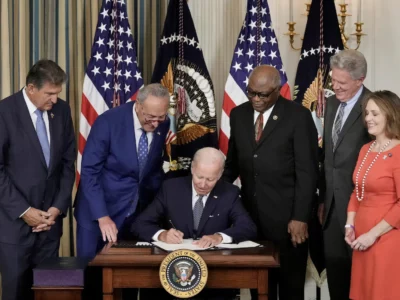Climate Politics
How to Make Climate as Compelling as Egg Prices
While politicians are right to focus on cost of living, it’s dangerously wrong to assume voters rejected climate policies in the 2024 election.
How do we make the climate crisis as compelling to voters as the price of eggs? That’s a question—an existential question—I’ve been asking myself for weeks now. My UCLA Emmett Institute colleagues and I have some ideas that I’ll be sharing over the next weeks and months. We’re hardly alone: Two months after a disheartening …
Continue reading “How to Make Climate as Compelling as Egg Prices”
CONTINUE READINGStep-by-Step: The Role of Sequencing in Effective Climate Policy
The key to climate policy is to start by supporting investments in new technologies that produce both innovation and political change
This is the third in a series of posts. The first post is here. The second post is here. How might sequencing work in climate policy? And why is it important? I’ll explore these questions by walking through the most important stage of climate policy – initiating action on climate change. The initial steps of …
Continue reading “Step-by-Step: The Role of Sequencing in Effective Climate Policy”
CONTINUE READINGThe Multiple Goals of Climate Policy
Effective climate policy requires consideration of efficiency, equity, technological innovation, carbon reductions and political feasibility
This is the second in a series of posts. The first post is here. When people think about climate policy, they probably think that the goal of climate policy is reducing greenhouse gas emissions. And of course, the ultimate goal of climate policy is to reduce emissions, eventually getting us to an economy that is …
Continue reading “The Multiple Goals of Climate Policy”
CONTINUE READINGThe Difficult Politics of Climate Change
How can we enact policy that is effective, resilient, and expands its ambition over time?
Climate change is a difficult problem to solve, politically. The costs of addressing climate change are born by current generations, but the benefits accrue to many generations to come. Addressing climate change might require people today to make significant sacrifices to benefit people around the world, as well as future generations. There are significant, powerful …
Continue reading “The Difficult Politics of Climate Change”
CONTINUE READINGDeal or No Deal?
Should Congress pass EPRA?
This is the second in a series of posts on permitting reform. The first post is here. Given the provisions of the Energy Permitting Reform Act (EPRA), should Congress enact it as it stands now? Answering that question is tricky, in part because it depends both on uncertain political and administrative action, as well as …
Continue reading “Deal or No Deal?”
CONTINUE READINGShould We Do Permitting Reform?
What is at stake with the Manchin bill.
As Congress wraps up its lame duck session before the new Congress and President arrive in January, there is a lot of debate about whether to move forward on permitting reform within a quickly shrinking window of time. The basis of debate is the Energy Permitting Reform Act (EPRA) co-sponsored by Senators Manchin and Barrasso. …
Continue reading “Should We Do Permitting Reform?”
CONTINUE READINGEven in Dark Times, There are Still Reasons to be Thankful
The election was largely a disaster. But we’ve also seen some positive developments.
Trump’s triumphant return to power promises to be a disaster for environmental protection, casting a pall over all else. Even so, if you’re someone who cares about energy and environment, there are some things to be thankful for ithis year Here are a few.
CONTINUE READINGClimate Politics and Electoral Realignment
Some deep-seated dividing lines in U.S. politics seem to be eroding, with potential implications for climate policy.
The electorate is changing. Racial divisions are blurring, the GOP has gained a solid following among working class voters (especially whites), and college graduates and those with above median incomes have shifted to the Democrats. Among the many effects will be changes in the politics surrounding climate change. We will start to see an increased rate of success for advocates of climate actions in off-year and down-ballot races.
CONTINUE READINGCarrots Are More Durable Than Sticks
Laws like the Inflation Reduction Act may have more sticking power than regulations.
it’s hard to repeal subsidies and tax credits. We’re seeing that right now in Congress. There’s been a lot of talk by Trump and others of blowing away the IRA. But many billions of dollars of IRA investments are being made in Republican congressional districts. And this has had an effect. Subsidies won’t solve the climate crisis on their own, but they provide a solid economic and political foundation for climate policies of all kinds.
CONTINUE READINGWith a Week to Go, Where Do the Elections Stand?
The Presidential, Senate & House elections will have immense repercussions in terms of energy and environment.
This elections seemunusually weighty in its policy implications. In terms of energy and climate policy, the two parties parties are far apart — Republicans favor energy dominance through massive fossil fuel production, Demorats favor clean energy. To the immense frustration of people on both sides, things haven’t moved much since September, when I last wrote …
Continue reading “With a Week to Go, Where Do the Elections Stand?”
CONTINUE READING








